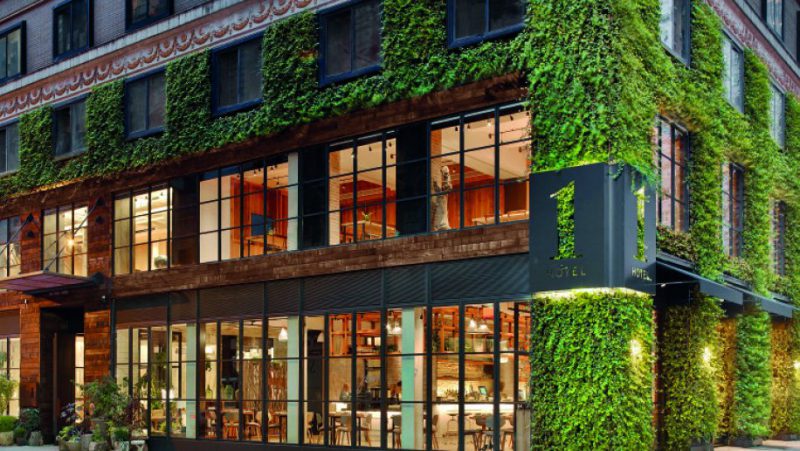Stay Green
Hotels are recognizing the need to do more when it comes to sustainability – but there are steps we travelers can take as well
August 28, 2019


We all want to be good citizens of the world, but how do we reconcile traveling around the planet while at the same time not harming it?
Choosing Your Hotel
A property needs to be in a convenient location, at an affordable price and with the facilities and services you require, but once those factors are satisfied, how do you judge whether it is environmentally friendly? Keeping track of a hotel’s sustainability progress is not easy, but here are some things to look out for.
There are various certifications and classifications available for properties worldwide, but the global nature of the hotel industry, and the fact that different countries have different standards, can make this a confusing area. Bear in mind too that most hotels have been built by developers, may be operated by a third party, and are then perhaps marketed and branded by one of the well-known chains. In such circumstances, finding out just how green your hotel is can be a daunting task.

First, as a rule of thumb, new hotels will have been built to higher environmental specifications than was required for older properties, and will have better technology at their disposal. Some of these properties will market themselves as having a LEED (Leadership in Energy and Environmental Design) rating. Awarded by the USGBC (the US Green Building Council), this globally recognized certification must be applied for and covers eco new-builds, renovations and interior fittings. Marriott International, for instance, is pursuing LEED certification or equivalent at 650 of its newer or refurbished hotels.
Other groups have taken a different route. Accor is a founding member of the Association pour le Developpement du Bâtiment Bas Carbone. This organization is developing a low-carbon building certification (BBCA) accounting for a building’s greenhouse gas emissions throughout its lifecycle, from construction through to operation and eventual demolition and recycling. This building standard was applied throughout the construction of the new Jo&Joe Paris-Gentilly.
To meet the targets required by certification boards, hotels need to be rigorous in monitoring their greenhouse gas emissions and waste production. Accor’s Gaia tool, launched in 2016, allows its network of hotels to create plans and monitor sustainability progress. Marriott International promises that all properties will have a Serve 360: Doing Good in Every Direction section on the website displaying hotel impact metrics by the end of next year, while IHG’s Green Engage platform has four levels of certification and offers hotels “200 Green Solutions” – ways to report and manage their carbon, energy, water and waste. The group says that last year almost 8,000 solutions were implemented globally, with those using the platform avoiding a total of $67 million in costs.
Systems, however, are not always centralized. Iberostar Hotels and Resorts has invested more than €33 million ($37 million) into improving energy consumption behavior across its 100 properties, but has a more localized approach. For example, the Iberostar Selection Cancun has an Intelligent Building System that monitors and controls temperatures in the hotel, while the Iberostar Selection Playa Mita in Mexico installed systems that collect kinetic energy from moving elevators, reducing energy use by 50 percent.
Being a Green Guest
Other than taking note of green accreditations, guests trying to be more eco-conscious should abide by the “small is beautiful” motto. Budget stays are more sustainable because of their modest nature; smaller rooms and fewer restaurants are conducive to low energy consumption and waste production. Take Accor, for instance, whose 4,800 hotels range from luxury to budget. In terms of food waste alone, the upscale properties average 47 tons per year, while its economy hotels pale at 17 tons.
When traveling, there can be an element of “out of sight, out of mind,” with guests viewing vacations as a break from conscious eco-friendly behavior. Booking.com reported this year that 46 percent of travelers struggle to make sustainable choices on vacation compared with everyday life. Lights are left on, fresh towels are requested daily and miniature toiletries are relished.
That’s where monetary incentives can come in. As suggested by its name, eco-friendly Hotel Verde in Cape Town encourages “green” behavior by rewarding guests with Verdinos, its in-house currency. Verdinos can be used towards your bill or at the hotel bar and deli, or you can donate them to a good cause.
IHG Rewards Club members staying at one of the group’s properties for two nights or longer can choose “A Greener Stay,” opting out of housekeeping services in exchange for points. “It’s a triple win – allowing the hotels to run more efficiently and save costs, enabling guests to lower their travel footprint, and reducing IHG’s overall impact on the environment,” an IHG spokesperson says.
Accor has also incorporated sustainability into its loyalty program. As explained by the group’s sustainable development director, Arnaud Herrmann, “guests can both earn and burn their points by participating actively in meaningful sustainable causes,” such as a light housekeeping service.
Where hoteliers and guests lose their momentum, governments can steer them in the right direction. The Shanghai Municipal Administration of Culture and Tourism, for example, started issuing fines of up to $725 beginning in July if hotels equip rooms with disposable amenities such as toothbrushes, nail files and shower scrubs. Reception can still provide such products if requested, shifting accountability for eco-conscious decisions to the guest.
Behavioral changes are paramount to the success of sustainability programs. As hotel groups strive for loyalty, frequent travelers have a huge amount of power when it comes to driving change in the industry. And many are willing to do so, with 55 percent of travelers more determined to make sustainable choices than last year according to Booking.com.
What’s crucial, says Gloria Fluxa, vice-chairman and chief sustainability officer of Iberostar, is that guests “do not underestimate the power of small steps,” whether that’s using reusable water bottles, keeping informed about green activities (beach clean-ups, for example), or ordering sustainable fish in a hotel’s restaurants – Iberostar is the first chain in Southern Europe to be certified with the Marine Stewardship Council. Fluxa adds that sustainable measures are “not taking away the excellence of the experience,” instead making it more enriching.
IHG has also eliminated an average of 50 million straws annually from its properties, and uses recycled plastic to its advantage. The group is working with supplier Ege to test its 100 percent recycled yarn carpets, crafted from industrial nylon plastics and fishing nets salvaged from the ocean.
Iberostar has gone one step further with its Wave of Change initiative, which focuses on the conservation of oceans through the elimination of single-use plastics, promotion of sustainable fishing and improvement of coastal health. Oceans have “always been a part of our DNA,” stresses Fluxa, with 80 percent of its properties located on a seafront. The chain has already replaced all single-use plastic products in its 40 hotels in Spain.

“We intend to become single-use plastic free up to the limits that the legislation allows by the end of 2020,” she says – legislation differs in the 19 countries in which the chain operates – but she stresses that “we’re doing our homework and want to move towards a circular economy.” How is Iberostar doing this? “We did an extensive audit of products internally and looked at how they could be substituted and the operational implications of this,” Fluxa explains.
Staff Engagement
Just as guests can apply pressure from outside, hotel employees have an influence internally. As Fluxa puts it: “The most important stakeholder for this movement is our staff. If they don’t understand [the framework], they won’t be able to explain it to guests.” Iberostar staff have accordingly been trained by NGO Fishwise about the responsible consumption of seafood.
Other companies have launched imaginative initiatives to get employees on board. Scandic, the largest hotel operator in the Nordic market, has involved staff in its sustainability endeavors since 1993, when a team member’s “hang up your towel” policy became standard practice worldwide. Last year, it wanted to “add a fun spin” to its efforts, according to Vanessa Butani, Scandic’s director of sustainable business, with 18,000 team members participating in a “sustainability hackathon.” Staff submitted 400 social and environmental ideas, which were voted on before facing a jury.
Turn off the Tap, the winning environmental idea, will pilot this summer in Norway. Guests are advised not to run the water when brushing their teeth, aiming to save more than 50 million gallons per year.
Accor similarly engages staff through its Acting Here app for employees, which launched in April last year. The app includes both educational and activity elements, allowing staff to receive rewards for publishing selfies of their sustainable actions, or doing quizzes to boost their knowledge.
Cutting Food Waste
While sustainable initiatives may seem altruistic, there is a financial incentive, too. Accor’s food and beverage accounts for half of its waste, 40 percent of its global water consumption, and is the second-largest contributor to its carbon footprint.
In fact, one-third of all food produced in the world is lost or wasted. To address this, chains such as Accor and IHG have partnered with Winnow, a company using smart meter technology to record and analyze food waste. According to Winnow’s co-founder, Marc Zornes, “Although the scale of the problem is enormous, it presents a huge opportunity for businesses to recover value and become more efficient.” Through Winnow’s real-time reports, “businesses and chefs can adjust their food purchasing decisions accordingly, reduce their spending and tackle a fundamental problem of food waste: overproduction.”
Accor’s Sofitel Bangkok Sukhumvit piloted the system in 2015, resulting in a 50 percent reduction in food waste within four months, and estimated annual savings of more than $60,000. In fact, charity WRAP and the World Resources Institute found that a typical food manufacturing, retail or hospitality business could achieve a 14:1 return on investment by reducing food waste. Such technology will prove useful in helping Accor to achieve its aim of reducing food waste by 30 percent by next year.
Scandic is working with digital platforms Karma and Too Good to Go to sell leftover food at half the cost price. Last year the group saved more than 125,000 portions of unsold food using such digital platforms.
It’s not all about technology. Accor’s Novotel Nantes Carquefou creates puddings from breakfast pastries while the Pullman Auckland uses peel from juiced oranges to make marmalade. Through a combination of behavioral changes, technology and creativity, it is entirely possible to meet the UN’s Sustainable Development Goal 12.3, the reduction of global food waste by 50 percent by 2030.
Cooperation between companies will be crucial in meeting targets. “Fully aware of our environmental footprint, we are convinced that eco-responsible hotel management is a collective concern,” says Accor’s Herrmann. Its Planet 21 online platform shares studies, research and best-practice analyses regarding sustainable development in the hotel industry. IHG, meanwhile, is a founding member of the International Tourism Partnership, which brings hotel companies together to coordinate action across the globe to achieve goals of environmental and social responsibility.
And in the meantime, there’s plenty of small steps you can take yourself to travel more sustainably – see Smart Traveler (page 64) for more tips.




